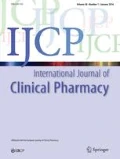Abstract
Background Polypharmacy—taking five or medications per day—is common in lung cancer patients. This patient group is prescribed medication to control acute symptoms associated with cancer and also to prevent or treat other long-term conditions. These medications increase the pill burden for the patient and also the probability of developing a drug-related toxicity. Objective To assess the prevalence of inappropriate medication in patients taking erlotinib for the treatment of advanced non-small cell lung cancer. Method This was a multicentre study across three sites in the North of England. Medication histories for patients receiving erlotinib were retrospectively extracted from medical notes and assessed by the clinical team (a consultant pharmacist, nurse specialist and clinical oncologist) to determine if the medication was appropriate or inappropriate. The clinical team considered the following factors when deciding if the medication was appropriate or inappropriate: remaining life expectancy of the patient, time until benefit of the treatment, goals of care and treatment targets. Results Among the 20 patients assessed, 19 (95 %) according to the clinical team were taking medications that were inappropriate. The mean number of medications the patients were taking was 8 (range 1–16) and the most common class of medication used were drugs affecting the Central Nervous System. In addition, there were 11 patients (55 %) who were taking erlotinib in combination with a proton pump inhibitor (PPI)—a clinically significant drug interaction that impairs the absorption of erlotinib. Conclusions Patients taking erlotinib for the treatment of advanced non-small cell lung cancer take many inappropriate medications for the treatment or prevention of long-term conditions. These patients should have their medications reviewed in the context of their original therapeutic goals.
References
Hohl CM, Dankoff J, Colacone A, Afilalo M. Polypharmacy, adverse drug-related events, and potential adverse drug interactions in elderly patients presenting to an emergency department. Ann Emerg Med. 2001;38:666–71.
Hanlon JT, Schmader KE, Koronkowski MJ, Weinberger M, Landsman PB, Samsa GP, et al. Adverse drug events in high-risk older outpatients. J Am Geriatr Soc. 1997;45:945–8.
Lees J, Chan A. Polypharmacy in elderly patients with cancer: clinical implications and management. Lancet Oncol. 2011;12:1249–57.
Riechelmann RP, Zimmermann C, Chin SN, Wang L, O’Carroll A, Zarinehbaf S, et al. Potential drug interactions in cancer patients receiving supportive care exclusively. J Pain Symptom Manag. 2008;35:535–43.
Girre V, Arkoub H, Puts MT, et al. Potential drug interactions in elderly cancer patients. Potential drug interactions in elderly cancer patients. Crit Rev Oncol Hematol. 2011;78:220–6.
van Erp NP, Gelderblom H, Guchelaar HJ. Clinical pharmacokinetics of tyrosine kinase inhibitors. Cancer Treat Rev. 2009;35:692–706.
Holmes HM, Hayley DC, Alexander GC, Sachs GA. Reconsidering medication appropriateness for patients late in life. Arch Intern Med. 2006;166:605–9.
Fede A, Miranda M, Antonangelo D, Trevizan L, Schaffhausser H, Hamermesz B, et al. Use of unnecessary medications by patients with advanced cancer: cross-sectional survey. Support Care Cancer. 2011;19:1313–8.
Stavrou EP, Buckley N, Olivier J, Pearson SA. Discontinuation of statin therapy in older people: does a cancer diagnosis make a difference? An observational cohort study using data linkage. BMJ Open. 2012;2:e000880.
Schuling J, Gebben H, Veehof LJ, Haaijer-Ruskamp FM. Deprescribing medication in very elderly patients with multimorbidity: the view of Dutch GPs. A qualitative study. BMC Fam Pract. 2012;13:56.
Tarceva Summary of Product Characteristics. Available at http://www.medicines.org.uk/EMC/medicine/16781/SPC/Tarceva+25mg%2c+100mg+and+150mg+Film-Coated+Tablets/. Accessed 21 Nov 2012.
Conlon LS, Romero-Ortuno R, Smyth B, Ryan R, Cogan L. General and risk management, patient safety (including: medication errors, quality control): the effect of pharmacist intervention on psychotropic prescribing through clinical medication review in a long-term care hospital in Dublin. Eur J Hosp Pharm. 2012;19:127–8.
Gallagher P, Ryan C, Byrne S. STOPP (screening tool of older person’s prescriptions) and START (screening tool to alert doctors to right treatment). Consensus validation. Int J Clin Pharmacol Ther. 2008;46:72–83.
Fick DM, Cooper JW, Wade WE, Waller JL, Maclean JR, Beers MH. Updating the beers criteria for potentially inappropriate medication use in older adults: results of a US consensus panel of experts. Arch Intern Med. 2003;163:2716–24.
Maddison AR, Fisher J, Johnston G. Preventive medication use among persons with limited life expectancy. Prog Palliat Care. 2011;19:15–21.
Hilton JF, Seymour J, Le Maitre A, Tu D, Shepherd FA and Bradbury PA. An evaluation of the possible interaction of gastric acid suppressive medication and the EGFR tyrosine kinase inhibitor erlotinib. J Clin Oncol. 2011;29(suppl) (abstr 7523).
Funding
None.
Conflicts of interest
None of the authors have any conflicts of interest concerning this work.
Author information
Authors and Affiliations
Corresponding author
Rights and permissions
About this article
Cite this article
Todd, A., Williamson, S., Husband, A. et al. Patients with advanced lung cancer: is there scope to discontinue inappropriate medication?. Int J Clin Pharm 35, 181–184 (2013). https://doi.org/10.1007/s11096-012-9731-2
Received:
Accepted:
Published:
Issue Date:
DOI: https://doi.org/10.1007/s11096-012-9731-2

